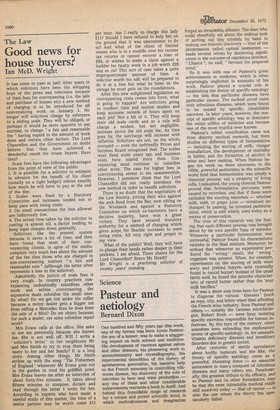The Law
Good news for house buyers?
Ian McD. Wright
It has come to pass at last! After years in which solicitors have been the whipping boys of the press and television because of their fees for conveyancing (i.e. the sale and purchase of houses etc) a new method of charging is to be introduced for all conveyancing work on January 1. No longer will solicitors charge by reference to a sliding scale. They will be obliged, or perhaps it would be more apposite to say entitled, to charge "a fair and reasonable fee" having regard to the amount of work done and certain other factors. The Lord Chancellor and, the Government no doubt believe that they have achieved a vonderful result for house buyers. Have they?
Scale fees have the following advantages from the point of view of the public: 1. It is possible for a solicitor to estimate in advance for the benefit of his client (usually on a tight budget) almost exactly how much he will have to pay at the end of the day.
2. Scales were fixed by a Statutory Committee and increases tended not to keep pace with rising costs.
3. On small transactions the fees allowed are ludicrously low.
4. The actual time taken by the solicitor in costing is almost nil, a.factor tending to keep legal charges down generally.
Solicitors like the present system because it saves a lot of time, and they have found that most of their conveyancing clients, in spite of the media, complain very much less about the amount of the fee than those who are charged in non-conveyancing matters "a fair and reasonable sum" (although the latter often represents a loss to the solicitor).
Admittedly the justice of scale fees is very rough. In country practices conveyancing undoubtedly subsidises other work and within conveyancing the expensive deals subsidise the small ones. So what? Do we get hot under the collar because a motor dealer gets a bigger cut from selling a Mercedes than he does from the sale of a Mini? Do we object because, for such a dealer, car sales subsidise repair work?
Mrs Evans calls at the office. She asks to see me personally because she knows me. She is not well off. Will I write a solicitor's letter' to her neighbours Mr and Mrs Smith to try to stop them being nasty to her and her family? It is a long story. Among other things, Mr Smith strikes up with the song The Fishermen of England' whenever Mr Evans goes out in the garden to tend his goldfish pond. Mrs Evans leaves me after an interview of about forty-five minutes. It takes about fifteen minutes to compose, dictate and read through the letter I write for her. According to experts who have made a careful study of this matter, the time of a senior partner may be worth some £11 per hour. Am I really to charge this lady £11? Should I have refused to help her on the ground that it was uneconomic to do so? And what of the client of limited means who is in a muddle over his income tax returns or cannot recover a loan of £50, or wishes to make a claim against a builder for faulty work in a job worth £25 and so on? This sort of case takes a quite disproportionate amount of time. A solicitor worth his salt will be prepared to do it at a loss but what he loses on the swings he must gain on the roundabouts.
After this new enlightened legislation on conveyancing costs comes into force, what is going to happen? Are solicitors going to conduct time and motion studies and keep accurate records of hours spent on each job? Not a bit of it. They will keep their old scale cards and as a rule will charge a modest, but not negligible, increase above the old scale fee. As time goes by, the surcharge will increase with inflation. Solicitors are not, on the whole, overpaid — even the unfriendly Prices and Incomes Board recognised that. The scales were fixed some years ago and business costs have soared since then. Conveyancing must continue to subsidise other work. The case for higher fees in conveyancing seems to me unanswerable. However, I somehow think that the Lord Chancellor did not really introduce the new method in order to benefit solicitors.
There is no doubt that the negotiators of the Law Society, pitting their wits against the arch fiend from the Bar, now sitting on the Woolseck and against a Statutory Committee on which ex-barristers have a decisive majority, have won a great victory. They have secured statutory authority for a method of charging which gives scope for flexible increases to meet rising costs. All very right and proper in my view.
What of the public? Well, they will have to plunge their hands rather deeper in their pockets, I am afraid. Three cheers for the Lord Chancellor? Bravo Mr Heath?
Mr Wright is a practising solicitor of twenty years' standing


































 Previous page
Previous page